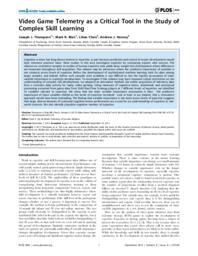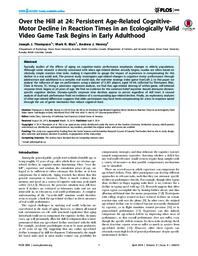Henrey, Andrew J.
Person Preferred Name
Andrew J. Henrey
Related Works
Content type
Digital Document
Abstract
Cognitive science has long shown interest in expertise, in part because prediction and control of expert development would have immense practical value. Most studies in this area investigate expertise by comparing experts with novices. The reliance on contrastive samples in studies of human expertise only yields deep insight into development where differences are important throughout skill acquisition. This reliance may be pernicious where the predictive importance of variables is not constant across levels of expertise. Before the development of sophisticated machine learning tools for data mining larger samples, and indeed, before such samples were available, it was difficult to test the implicit assumption of static variable importance in expertise development. To investigate if this reliance may have imposed critical restrictions on the understanding of complex skill development, we adopted an alternative method, the online acquisition of telemetry data from a common daily activity for many: video gaming. Using measures of cognitive-motor, attentional, and perceptual processing extracted from game data from 3360 Real-Time Strategy players at 7 different levels of expertise, we identified 12 variables relevant to expertise. We show that the static variable importance assumption is false - the predictive importance of these variables shifted as the levels of expertise increased - and, at least in our dataset, that a contrastive approach would have been misleading. The finding that variable importance is not static across levels of expertise suggests that large, diverse datasets of sustained cognitive-motor performance are crucial for an understanding of expertise in real-world contexts. We also identify plausible cognitive markers of expertise.
Origin Information
Content type
Digital Document
Abstract
Typically studies of the effects of aging on cognitive-motor performance emphasize changes in elderly populations. Although some research is directly concerned with when age-related decline actually begins, studies are often based on relatively simple reaction time tasks, making it impossible to gauge the impact of experience in compensating for this decline in a real world task. The present study investigates age-related changes in cognitive motor performance through adolescence and adulthood in a complex real world task, the real-time strategy video game StarCraft 2. In this paper we analyze the influence of age on performance using a dataset of 3,305 players, aged 16-44, collected by Thompson, Blair, Chen & Henrey [1]. Using a piecewise regression analysis, we find that age-related slowing of within-game, self-initiated response times begins at 24 years of age. We find no evidence for the common belief expertise should attenuate domain-specific cognitive decline. Domain-specific response time declines appear to persist regardless of skill level. A second analysis of dual-task performance finds no evidence of a corresponding age-related decline. Finally, an exploratory analyses of other age-related differences suggests that older participants may have been compensating for a loss in response speed through the use of game mechanics that reduce cognitive load.
Origin Information
Content type
Digital Document
Abstract
In tasks that demand rapid performance, actions must be executed as efficiently as possible. Theories of expert motor performance such as the motor chunking framework suggest that efficiency is supported by automatization, where many serial actions are automatized into smaller chunks, or groups of commonly co-occuring actions. We use the fast-paced, professional eSport StarCraft 2 as a test case of the explanatory power of the motor chunking framework and assess the importance of chunks in explaining expert performance. To do so, we test three predictions motivated by a simple motor chunking framework. (1) StarCraft 2 players should exhibit an increasing number of chunks with expertise. (2) The proportion of actions falling within a chunk should increase with skill. (3) Chunks should be faster than non-chunks containing the same atomic behaviours. Although our findings support the existence of chunks, they also highlight two problems for existing accounts of rapid motor execution and expert performance. First, while better players do use more chunks, the proportion of actions within a chunks is stable across expertise and expert sequences are generally more varied (the diversity problem). Secondly, chunks, which are supposed to enjoy the most extreme automatization, appear to save little or no time overall (the time savings problem). Instead, the most parsimonious description of our latency analysis is that players become faster overall regardless of chunking.
Origin Information



